Given the importance of the developing racketeering scandal in Macedonia, Republika has prepared full background and analysis of the events so far, to be updated daily.
What’s new
What’s new
Prosecutor Vilma Ruskoska informs that the second phone used by Special Prosecutor Katica Janeva, the one she initially claimed she lost, was wiped clean of all data.
VMRO-DPMNE President Hristijan Mickoski discussed the growing corruption scandal in Macedonia with Hungarian prime Minister Viktor Orban during their meeting in Budapest.
A video from the opening ceremony of a charity organization set up by Boki 13 shows him praising Prime Minister Zoran Zaev for his support and direct “logistics”.
Background
The Special Prosecutor’s Office was formed in 2015, as part of the major political crisis which erupted in Macedonia, when opposition leader Zoran Zaev began publishing segments from a large cache of wiretaps that contained conversations between officials of the VMRO-DPMNE led Government. Zaev insisted that the recordings contain evidence of wrongdoing on the part of Prime Minister Nikola Gruevski and top Government officials, including election rigging, corruption and attempts to cover up murders. The SDSM party used the wiretaps to fuel protests that at times included tens of thousands of people. Zaev was charged with attempting to overthrow the Government with the help of former UBK secret service chief Zoran Verusevski and other rogue UBK officers who were charged with the wiretapping. The tapes touched on exceptionally emotional issues, such as the 2011 murder of a young VMRO supporter by a police officer and the 2013 car crash which killed prominent right wing journalist Nikola Mladenov, both of which were turned into conspiracy theories by the SDSM party meant to portray VMRO in the worst possible light (both these cases were recently thoroughly debunked but served their purpose to fuel the Colored Revolution protests).
The attack on the city of Kumanovo, by Albanian terrorists in 2015, at the peak of the first wave of Colored Revolution protests, was also declared a “false flag attack” by SDSM and some of its supporters in the international media, as was the 2012 Good Friday massacre, when three Albanian islamists killed four Macedonian youngsters and a man on the eve of Good Friday in an apparent attempt to spark a religious war.
Under significant international pressure from the diplomatic coprs in Skopje, the US State Department and the European Commission, talks began in the EU Ambassador’s residence in Przino, between VMRO-DPMNE, SDSM and the Albanian DUI and DPA parties. One of the results of the talks was to create an office led by a prosecutor accepted by all four parties, which will investigate the cache of wiretaps and use it as a basis to bring criminal charges against office holders and businesses suspected of crimes. On the part of VMRO, it was expected that the Special Prosecutor’s Office (SPO) will investigate the wiretapping and will bring charges against Zaev and Veruevski, while on the part of SDSM, the request was that the SPO will bring corruption charges against Gruevski and other members of his Government.
Katica Janeva, an unknown prosecutor from the small town of Gevgelija, was selected in September 2015 among a group of well known prosecutors and law professors who applied for the job. Her office received significant funding and began hiring staff from existing state prosecutor’s services lured by the promise of high salaries and prestige that comes with being at the focus of the political crisis. Diplomats and international visitors made the SPO office an obligatory stop on their tours of Skopje, and kept insisting that the Gruevski Government respects its independence, doesn’t obstruct its investigations and that the courts and the police acts on its arrest warrants. International media outlets fawned over Janeva, and her two younger assistants, Lence Ristoska and Fatime Fetai, who were the faces of the organization. Zaev publicly delivered boxes of wiretaps and transcripts to the SPO office, claiming that the entire cache, its one and only copy, is now given to Janeva, so she can begin listening to the tapes herself. The office was given until mid 2017 to listen to tapes and bring its charges, which emphasized its temporary nature.
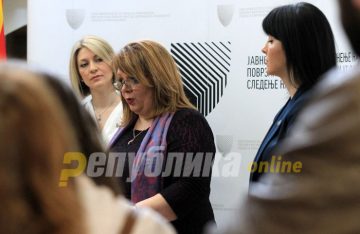
Despite being elected by consensus, Katica Janeva quickly moved to appoint prosecutors, investigators and other assistants exclusively from the left. Several prosecutors who were announced as part of her team were quickly sidelined. Those that remained included a close acquaintance of one of Zaev’s lawyers and a prosecutor whose father was dismissed as judge after a corruption investigation initiated under the VMRO Government. Janeva moved to hire organizers and activists of the SDSM led Colored Revolution into the staff, including some who would support her actions at the SDSM affiliated media outlets, under the guise of independent commentators. The other way of getting hired by the SPO was nepotism – Janeva’s relatives, her son’s girlfriend, the daughter of this prosecutor, the daughter of that SDSM official, they were all on the short list. Shortly after her appointment, the impression of an impartial prosecutor who would go against both major Macedonian parties and (perish the thought) the ethnic Albanian DUI party, was gone.
Janeva revealed her first charges in February 2016, accusing several of Gruevski’s ministers of election tampering. She continued to press charges exclusively against VMRO officials – one alleged that Gruevski and Interior Minister Gordana Jankuloska violated internal regulations when they ordered the purchase of an armored Mercedes to carry visiting foreign dignitaries. Other used a wiretap in which Gruevski and Transportation Minister Mile Janakieski discuss percentages involving the construction of two major Chinese funded highways to allege that they are talking kick-backs (the Government insisted that the word applies to the percentage of involvement of Chinese vs Macedonian subcontractors which is part of the contract). Gruvski’s cousin, UBK chief Saso Mijalkov was charged with torture after the allegedly overly rough arrest of former Interior Minister Ljube Boskoski, who was caught receiving an illegal campaign contribution from a foreign businessman in 2011. All case files began with the letter T, leading to various speculations about what comes next, and prosecutor Fetai would theatrically read out the charges, including curse words used by Mijalkov.
The Colored Revolution supporters were entranced. T-shirts with the images of the three prosecutors were printed out, memes of Fetai cursing and rolling her eyes spread on SDSM supporting Facebook groups, friendly outlets would happen by when Lence Ristoska would receive applause when walking into a cafe in Skopje… In general, a major propaganda campaign was put in place to promote the SPO, leading to rumors that Fetai may run for President in 2019, of sooner, especially if she manages to indict President Ivanov by then.
Meanwhile, the one case not named with the letter T – the Coup charges which were filed against Zaev, Verusevski and other accomplices by Public Prosecutor Marko Zvrlevski, was also handed over to the SPO, as the law required. The case was quickly turned on its head, as Janeva withdrew the charges against Verusevski and his accomplices, and insisted that it was Mijalkov and other top UBK officials who ordered the wiretapping, despite the fact that it implied an unlikely event – that Mijalkov ordered that he himself is recorded. Two of Verusevski’s accomplices who were sentenced, one of whom pled guilty, were released from prison and were quickly declared heroic whistleblowers by the Colored Revolution activists, who insisted that the group obeyed Mijalkov’s orders to follow himself, his cousin Gruevski and other officials of his own VMRO party, but then gave the recordings to Zaev to reveal this auto-destructive behavior.
Prime Minister Nikola Gruevski resigned in the winter of 2015, under the Przino agreement which provided for spring elections organized by a Government which included a new VMRO appointed Prime Minister and several SDSM ministers, but SDSM kept postponing the elections, demanding that its international supporters, prominent in the European Commission, socialist parties across Europe and also among US diplomats, exert pressure on Gruevski and VMRO to accept elections at a later date, after Janeva has been able to put them away.
In April 2016, President Ivanov insisted that the situation is putting Macedonia in a subservient position, indicating that it is all being done to push Macedonia to accept a damaging deal with Greece on the name dispute. Ivanov said that he can’t allow top Macedonian politicians to be held hostage by vague charges based on illegal wiretaps and gave a broad amnesty which covered Gruevski and his main associates, but also Zaev and Verusevski, Albanian politicians, practically everybody involved in the scandal. The Colored Revolution, which has lost steam by then, was re-energized, its activists burning down a downtown office of the Presidency, and diplomats reacted with outcry, forcing politicians to adopt a new law that introduced the option that persons who have received amnesties are able to ask the President to withdraw his decision. All those pardoned later, likely under international pressure, did so.
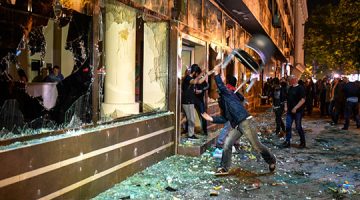
Janeva also initiated cases against some of the most outspoken VMRO supporting journalists. The choice of the “crimes” was apparently meant to humiliate them – in one, a female journalists was charged with tax fraud over a petty purchase of laundry written off as a business expense for a marketing agency she also ran, which employed models. Cue endless salacious reports about the “panties” of the journalist. More serious charges against media outlets included an SPO against against two businessmen who ran TV stations that support VMRO, Sitel and Nova, which influenced their editorial policy, and even led to Nova being shut down a few years later. The owner of the Netpress news site was questioned by the SPO in a procurement case and suffered early morning raids – he committed suicide in a state of despair after firing at a van parked in front of his apartment which he believed was following him.
By mid 2016, the plan to hold early general elections was in serious jeopardy, as SDSM insisted to remain part of the broad Government but kept postponing the elections, hoping that Janeva will deliver the death blow to Gruevski. This arrangement was broken off in May, when the Parliament was pressured by the diplomats to re-assemble after voting to dissolve and hold elections in June. This led to the removal of the SDSM members from the Government and the re-appointment of a political VMRO-DUI led Government, but still without Gruevski as Prime Minister. The two parties declared their intention to serve their term in full, declaring SDSM unserious and refusing to accept its part of the Przino bargain – the holding of elections. But, a month later, under the auspices of the Przino talks which included the US and EU Ambassadors, an agreement to hold elections in December was reached, and SDSM returned to the Government, while Janeva upped her work seemingly timing it with the campaign.
The elections were a win for VMRO, but an unexpected drift of Albanian voters from DUI toward SDSM allowed Zaev to significantly narrow down his losing margin. Gruevski was given the mandate to form the next Government, but amid reports of international pressure, and overt interference from the Albanian Prime Minister, DUI and other parties representing ethnic Albanians declared they will not join his coalition, leaving Zaev and SDSM as the only available option. This sparked protests by ethnic Macedonians and VMRO supporters, who demanded another round of early elections on the pretext that Zaev did not declare he will accept the so-called Tirana platform of Albanian nationalist demands written under the auspices of Prime Minister Edi Rama, when he ran in December 2016. Attempts by SDSM and DUI to elect a new Speaker which would lead to the creation of a new Government were met by Parliament filibustering by VMRO until April 2017, when SDSM and DUI forced a vote after the Parliament was dismissed for the day, prompting VMRO supporters to storm the Parliament, where some of them assaulted Zaev and other representatives, primarily Albanian MP Ziadin Sela. The EU and the US recognized Talat Xhaferi as the new Speaker that same evening, paving the way for the Zaev Government, which moved quickly to order arrests of VMRO officials based both on the SPO charges, and on charges brought by the new SDSM appointed Public Prosecutor Ljubomir Joveski and organized crime prosecutor Vilma Ruskoska going after opposition officials in cases not covered by the wiretaps.
In all, it’s estimated that hundreds of VMRO officials and activists were charged. This includes about 12 member of Parliament and a similar number of Mayors. Gruevski and his closest associates – Mijalkov, Ministers Gordana Jankuloska, Mile Janakieski and Vlado Pesevski, face SPO multiple charges and would frequently spend days in a row at the courthouse, barely having time to prepare for the next trial. One case alone, which Janeva used to order a freeze on the property owned by VMRO, had hundreds of party activists questioned by the police simply for donating small sums of money to the party.
Gruevski would often, in detail, explain the lunacy of the charges against him. As abuse of office requires that the official has gained something from the wrong-doing, and as the SPO could not prove he made material gains in any of the cases, he would explain how in a case focused on the construction of the two “Chinese highways”, his gain is in that he would “receive a popularity boost if the highways are built on time”. In another case, which prompted his eventual flight to Budapest, Gruevski is charged with ordering the purchase of the still very much in use armored Mercedes, and the gain is – that he would get to be driven in it from time to time.
The courts were pressured to accept unwarranted wiretaps as evidence, due to pressure from both the Zaev Government and the diplomats in Skopje. Some of the defendants, such as two UBK agents, fled to Greece where in May 2018 they eventually won a case before the Greek Supreme Court that declared President Ivanov’s 2016 amnesty as still valid. Many of the defendants in Skopje then evoked this decision insisting that the amnesty should be considered still valid for all defendants, but the Macedonian courts kept accepting arrest warrants from the SPO.
Another venue of defense is in that the SPO continued to open new cases even after its legal right to do so expired in the summer of 2017. This includes the now fatal “Empire” case, which Janeva launched against businessman Jordan Orce Kamcev, as well as the “Talir” case which Janeva used to freeze VMRO’s property, and whic the opposition party declared an all-out attempt to ban the party, leaving Zaev without a check on his power.
Meanwhile, as Zaev was able to appoint Ljubomir Joveski as the new Public Prosecutor – head of the much larger OJO unit, and Vilma Ruskoska as the new organized crime prosecutor, the importance of the SPO began to fade. More and more of the arrests mandated by Zaev’s campaign of political persecution against VMRO were ordered by the OJO prosecutors, who could act with no time constraints, and in any case – not requiring them to find a wiretap in Zaev’s cache that would spark an investigation. Most notable among these cases were the broad charges over the April 27th 2017 incident in the Parliament, which followed the SPO blueprint – accusing Gruevski and other leaders of the VMRO party of outrageous crimes – in this case of ordering terrorism, and actually prosecuting lower level officials and activists who would be pressured to testify against the party leaders.
This case was aimed against three VMRO members of Parliament, who were detained and eventually, in coordination with the courts, released from house arrest or detention precisely as the proposal to rename Macedonia was introduced in Parliament in October 2018, following the failed referendum. Ljuben Arnaudov, Saso Vasilevski and Krsto Mukoski voted in favor of renaming the country after being charged in the OJO “terrorism” case. Other members of Parliament who switch sides and voted for the “new name” include former Culture Minister Elizabeta Kanceska Milevska, Zekir Ramcilovik and Vladanka Avirovik, who were either directly charged by the SPO, or had close relatives (Avirovik’s son) or political allies (Nova TV owner Sead Kocan) in the SPO crosshairs. Getting Zaev to the 81 votes needed to rename Macedonia was a process started by the SPO, but Janeva’s team couldn’t finish the job – it required the additional charges brought forward by Vilma Ruskoska.
The scandal
The SPO continued to print out charges against more or less the same VMRO officials and several journalists in their cross-hairs, but, as time went by, they dragged a net toward businessmen. In October 2018 the SPO began an investigation into several mid sized companies which were invited to join in the management of the state owned Postal Bank. The next month, just as Gruevski was secretly heading to Budapest to seek political asylum, Janeva announced the Empire case, involving two major companies – Orka holding owned by Jordan Orce Kamcev and Pelisterka owned by Cvetan Pandeleski. Also charged was Mijalkov, again, as well as a number of lower level businessmen, all charged of laundering 11 million EUR. These two cases, along with the investigation into the REK Bitola coal mining contracts announced Janeva’s slow transition from prosecuting politicians to investigating businessmen and gave her a stranglehold over some of the richest people in Macedonia.
Just as the Empire charges were being announced, the flamboyant cross dressing reality TV personality Bojan Jovanovski – Boki 13 announced on his Instagram account his meeting with Janeva, where he also announced that something important is about to happen. Often dismissed as a weird fame seeker, Boki 13 started to show off more cash than usual. In April 2018 he started 1TV, a television modeled after the large A1 television, which combined popular entertainment programming with a strong pro-SDSM allegiance and had an eccentric owner who used the political clout given by the TV station to advance his business. But, while A1 grew over years, before it collapse after a tax audit in 2010, Boki 13’s television started spending huge sums of money and drew in some of the best known (and best paid) SDSM supporting journalists practically overnight.
Boki would also often post pictures with Zoran Zaev, SDSM party Secretary General Aleksandar Kiracovski, Interior Minister Oliver Spasovski, Defense Minister Radmila Sekerinska, and, naturally, Katica Janeva who would guest in the TV station along with some of her prosecutors. The opening of 1TV, in the grand Philharmonic Hall built by Gruevski, might as well have been a session of the Zaev Government, the SDSM Central Committee and both the SPO and OJO prosecuting units all rolled into one.
Where was the money coming from, the public was asking and the answer was provided in June, when a journalist normally close to SDSM, but prone to supporting factions in the party, Branko Geroski, started running a series of articles which he called the fictional account of a group of criminals, who he portrayed under made up names. One of them, Geroski wrote, is a easily agitated media outlet owner known for his passion for expensive clothes and who Geroski named “Koki”. A real head-scratcher, guessing who it might be. Geroski described how Koki, along with a top official of the ruling SDSM party named Kiki, nearly scared the owner of a small hotel in a resort town to death, when they sat him for an extortion meeting and as the man was expecting he’ll be on the hook for some reasonable sum, and offered a few thousand, Koki asked for 200.000 EUR in ad buys for 1TV. The second article presented Koki and Kiki pressuring a female Mayor of a city (clearly Natasa Petrovska from Bitola) to give them a piece of publicly owned land, so that they would develop a “charity” project. Geroski insisted that Petrovska refused the request, although Kiki comes from her city and is influential in the SDSM party, but that the scam worked with another SDSM Mayor, and the public land meant to be used for a welfare project was promptly resold for profit.
By the time of the third article the gloves were off and Geroski was describing how Koki is using wiretaps held by Katica Janeva to extort money from businessmen.
On July 15th all speculations about where Geroski’s articles are coming from were dispersed, as it was announced that Boki 13 was arrested while trying to flee Macedonia for Greece, carrying some of his money and having a few of his Skopje jet-set companions in tow. His associate Zoran Mileski – Zoki Kicheec was also arrested and a press conference by Public Prosecutor Ljubomir Joveski and Vilma Ruskoska was announced. Within an hour Katica Janeva tendered her resignation as Special Prosecutor, pending the appointment of a successor. Janeva did not mention Boki’s arrest, but said that she would like to step down so as not to disrupt the chances for Macedonia to open the EU accession talks, given that the opposition is vehemently opposed to her remaining as Special Prosecutor.
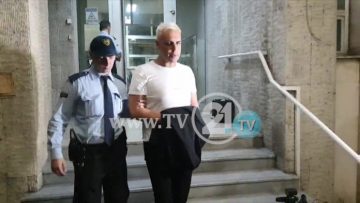
Joveski and Ruskoska announced that Boki 13 is arrested because he extorted 1.5 million from an unnamed businessman, promising that in return he will get an unnamed prosecutor to drop her charges against the businessman. It took about as much time to deduce who the businessman and the prosecutor are as it took to connect “Koki” with “Boki”. In a series of subsequent interviews, Ruskoska described how Boki 13 demanded that Orce Kamcev pays eight million EUR, then 7.5, then six and eventually extracted 1.5 million, before even he realized that Kamcev is recording their meetings. At times, according to Ruskoska, Kamcev would demand to receive assurances from Katica Janeva
herself, and she would be called up and would speak on the speakerphone, allowing him to capture her voice as well.
Janeva was searched by the end of the fatal Monday, with her office and home visited by the police, who demanded that she deliver her phones. She gave up one of them, and insisted she lost the other, but after a few days it was tracked in the possession of the girlfriend of her son Lazar Janev, who works for the SPO. Lazar, on the other hand, works for Boki 13’s 1TV . According to media reports, Boki would take Lazar Janev with him when he would present the exciting opportunity of purchasing 1TV ad space to businessmen who were targeted by Katica Janeva. The police also searched Boki’s and Lazar’s offices in 1TV and carried off their computers.
Both Boki 13 and Katica Janeva were quickly abandoned by their closest circle of supporters. The day after her tentative resignation and Boki’s arrest, Janeva’s team held a press conference in the SPO office to insist that any failures are limited to this one case, for which Janeva had direct responsibility, and all the other cases were led professionally. The press conference was conducted by Lence Ristoska. Fatime Fetai was absent, but several days later she joined in the position of the other prosecutors, despite the fact that she was defending Janeva as irreplaceable in an interview she gave for 1TV. A third prosecutor, Lile Stefanova, who was allegedly questioned over her knowledge about the Boki 13 scandal, defended herself before the press saying tartly that she had no authority to sign anything – directly pointing the finger at Janeva for any decisions to prosecute or to hold back on taking steps against defendants.
Shortly before Boki 13’s arrest, janeva reportedly tried to order that all computers used by the SPO are formatted. This would destroy logs revealing which prosecutor used which computer and when. The process started, and several computers were wiped clean before Janeva’s staff, afraid of adding destruction of evidence on top of other possible charges, demanded that the IT teams back off.
Boki 13 was also quickly dropped by his journalists, even Jadranka Kostova, who was interviewing him just a few days before his arrest, giving him a chance to present counter-allegations and defend himself from Gerovski’s claims. Kostova, the editor in chief Aco Kabranov, Saso Ordanoski and other leading media heavyweights announced that they were part time employees anyway, their contracts had nearly expired, or simply went on vacation and didn’t pick up the phone when the press asked them about Boki 13 and if they ever inquired how he made his money. Borjan Jovanovski, another leading 1TV anchor, quickly condemned Katica Janeva as stupid and a news site linked to him was publishing details about Boki 13’s crimes the very day of his arrest.
It also was reported that Kamcev, a veteran of the Macedonian political and business scene, turned for help to Bulgaria, where he has investments and whose honorary consul he is. According to these reports, put forward by Geroski as well, who said that he has interviewed Kamcev for his reports, Bulgaria provided wiretapping equipment, political backing and even a security detail. Zaev denied the reports that Bulgarian Prime Minister Boyko Borisov called him up and asked him to get Katica Janeva to lay off Kamcev. Prosecutor Ruskoska acknowledged that giving a bribe is as much an offense as taking one, but insisted that, as Kamcev reported the extortion, he should have a more favorable treatment. During the course of the Empire investigation he was detained, then allowed into house arrest, then freed but had his passport seized and eventually even the passport was returned, which the public found out when Kamcev was seen celebrating the EHF Champions League title won by Vardar in Germany. A suspiciously timed flooding in the SPO storage room destroyed some of the evidence precisely in Kamcev’s case, prompting outrage and mockery of the institution, with people claiming that “the fix is in”. It is believed that this gradually shifting treatment of Kamcev by the Special Prosecutor’s Office was conditioned by the payments he was making. The fate of the Empire case, thoroughly tainted by Janeva’s actions, is up in the air now.

Ruskoska sternly called on other businessmen who were pressured by the same group to come forward and provide evidence. Only one did – real-estate developer Zoran Azmanov has been accusing Boki 13 of trying to extort 50.000 EUR or an apartment, threatening that he would run a news item critical of Azmanov. Azmanov even briefly pointed to SDSM Secretary General Aleksandar Kiracovski as being involved in another extortion attempt on him, but then quickly withdrew the statement. A Bitola based businessman Borce Markovski, who was also named as a victim of extortion by an SDSM party official, also denied the report. Kiracovski rejected media questions over whether he is “Kiki” from Geroski’s reports and Zaev threatened media outlets who speculate on Kiki’s identity with libel suits.
Geroski alleged that another Bitola based company, the major Siljan Micevski owned Pelister mining and construction firm, was one of the main sourced or “revenue” for Boki 13. The attempt to transfer the money in the form of a joint contract for construction of a stae subsidised home for the elderly hit a road block with Mayor Petrevska, so at one point, Geroski reports, Micevski paid more than 700.000 EUR to Boki 13’s International Association charity, under contract to provide vague defined services. This was supposed to be the first of two equal installments and a similar contract brought Boki 13 more than 200.000 EUR from a Struga based construction company which allegedly wanted to build in Karpos, the Skopje municipality where Boki 13’s close friend Stefan Bogoev is Mayor.
Unable to go after Janeva or others named by Geroski, and with the businessmen still afraid to step forward, Ruskoska’s case quickly lost steam. So far only Boki 13 and Zoki Kicheec remain detained, Janeva has not been charged and SDSM is closing ranks around its suspected party officials. VMRO-DPMNE demands that Janeva is detained to stop her from destroying evidence, and to put pressure on her to reveal the Government officials who cooperated with the group or at least knew about it, especially after Zaev himself acknowledged knowing about the allegations months before the arrests. Geroski announced he will name Kiki and Friki, then dropped the idea, but began announcing a long
list of other SDSM officials, again under fake names, which he said he will start writing about in August unless Zaev cleans house by then.
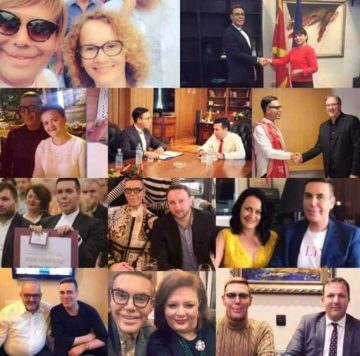
Geroski’s article revealing the Siljan Micevski payment also announced a major confrontation with a female top level SDSM party official, whose sister in law was allegedly involved in the corruption scandal through Boki 13’s fake charity. Geroski describes the politician’s sister in law as “one of the key persons in ‘Koki’s’ inntermost circle”. He stops short of naming the politician, but the article heralds a fissure in SDSM far greater than the one that could be caused by the possible arrests of “Kiki” and “Friki”.

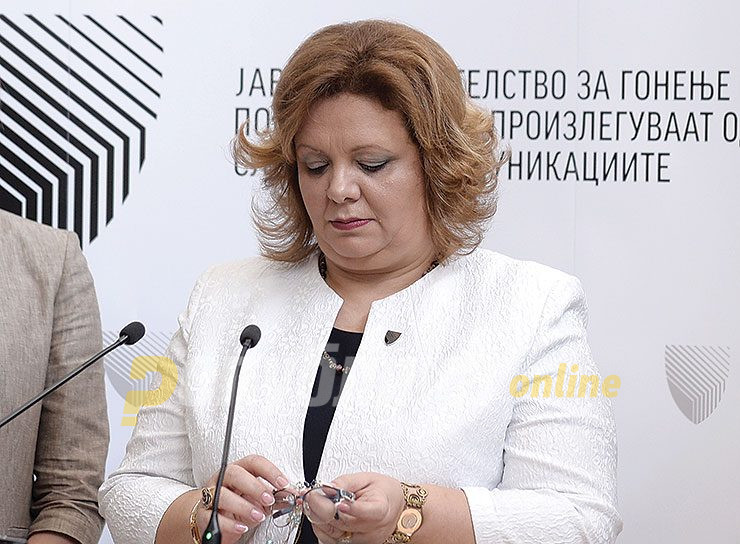



Comments are closed for this post.